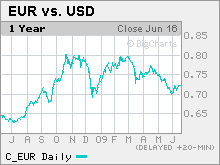Dollar slides against euro
Positive economic data supports sentiment for 'green shoots' of a recovery in the U.S. economy.
NEW YORK (Reuters) -- The dollar fell against the euro and higher-yielding currencies Thursday as generally positive U.S. economic data bolstered hopes the world's largest economy was on a stable path to recovery.
Action in the euro was particularly heavy, with the single European currency jumping against the Swiss franc amid speculation the Bank for International Settlements was buying euros on behalf of the Swiss National Bank to defend the 1.50-franc level.
But except for that brief movement in the euro/Swiss franc pair, traders were primarily focused on the ongoing debate about the global economic recovery.
On Thursday, a report showing stronger-than-expected business conditions in the U.S. Mid-Atlantic region and a weekly Labor Department report showing a decline in continued claims for jobless benefits seemed to appease investors worried about the pace of the economic rebound.
The U.S. data prompted investors to reduce their dollar holdings and buy other currencies such as the euro and Australian dollar.
The better-than-expected data "has improved risk appetite on the margin and has added to the dollar's somewhat negative tone this morning," said Omer Esiner, senior currency analyst at Travelex Global Business Payments in Washington.
"We're seeing the dollar come off and trade at lows of the day across the board."
In late morning trading, the euro was up 0.2% against the dollar to $1.3964 after rising as high as $1.4002.
The dollar rose 0.5% against the yen to ¥96.18. The Australian dollar, meanwhile, soared 1.2% versus the greenback to U.S.$0.8020
The euro surged to 1.5140 francs on electronic trading platform EBS from 1.5008. It was last at 1.5119 francs, up 0.4% on the day.
Several traders in the United States and London said they saw bids from the BIS in the currency market for the euro and offers to sell the Swiss franc. The BIS and SNB both declined to comment.
"It looks like the BIS have been in ... it's probably fair to say it's SNB-related," a London-based trader said.
The Swiss franc's move came after the SNB held interest rates at a record low on Thursday, keeping its target rate for three-month Swiss franc LIBOR at 0.00-0.75% with an aim to lower it to 0.25%.
SNB Governor Jean-Pierre Roth said he would continue to stop an irrational rise in the Swiss franc, but analysts said he did not confirm the SNB had acted beyond initial intervention after its last policy meeting on March 12 when the euro jumped to nearly 1.5350 francs from around 1.4750 francs.
Analysts said some traders were testing the resolve of the SNB on intervention, and the market was figuring out how low the euro/Swiss franc pair had to fall before the central bank would enter the market.
Another analyst at a U.S. currency firm said he noted a distinct change in tone from the SNB's press conference on Thursday. "I think the 'easy trade' of buying EUR/CHF on the 1.50 handle has now run its course."
While this analyst would not suggest selling euro/Swiss, he strongly suggested exiting longs on the currency strength or at least tightening stops significantly.
Markets were constantly on the alert for SNB action after the bank in March stunned the global foreign exchange market and bought euros and dollars versus the Swiss franc. Before that, the SNB had last physically intervened in August 1995. ![]()



